Incline Conveyor Belts – Efficient Vertical Transport Solutions
What Is Incline Conveyors?
🌟 Incline Conveyor Belts: Elevating Your Production Efficiency
Incline conveyor belts are a vital solution for modern material handling, designed to move goods smoothly and efficiently between different heights. By overcoming the limits of traditional horizontal conveyors, they optimize floor space and enable seamless upward or downward transfer of materials—even supporting vertical configurations in specialized setups.
From bulk goods like grains, sand, and ores to packaged items such as boxes, bags, or luggage, incline conveyors ensure steady, reliable flow. They are a cornerstone for upgrading production lines to automation and smart manufacturing.
At FILL PACKAGE, our incline conveyor systems stand out for their exceptional performance and flexibility, making them the perfect choice for businesses aiming to maximize productivity and reduce operational costs. By utilizing vertical space and supporting continuous, uninterrupted transport, these conveyors help you handle materials faster and smarter—unlocking greater efficiency and profitability for your operation.
Common Applications
Food Processing: Moving fresh produce, meat, bakery goods up inclines without bruising.
Packaging Lines: Elevating cartons, pouches, and bags to fill/seal stations.
Assembly & Manufacturing: Transporting parts between floors or work cells.
Bulk Material Handling: Conveying grains, pellets, and powders to hoppers or silos.
For companies seeking an incline conveyor belt for sale, we offer a range of standard models in stock for immediate delivery, as well as fully custom configurations. Whether you need a 10° gentle rise or a 35° steep incline, our belts come in various widths, materials, and cleat heights—ready to integrate seamlessly into your production line.
Inclined Belt Conveyor
| Material of frame : | Stainless steel 304 |
| Belt type : | Food grade polypropylene |
| Discharge height : | 3200mm |
| Width : | 300mm |
| Conveying capacity | 20m-25m/min |
| Power supply | 3P 380V /220V ,50Hz /60Hz |
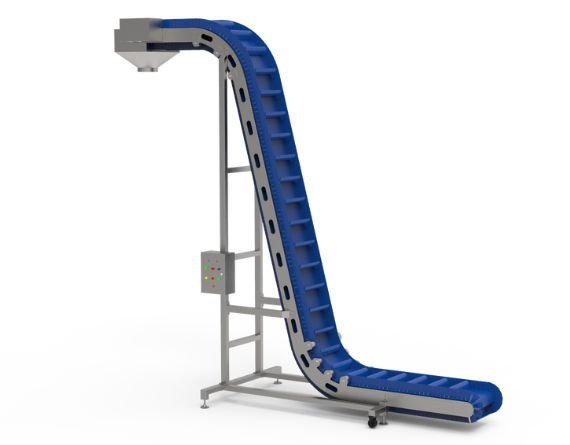
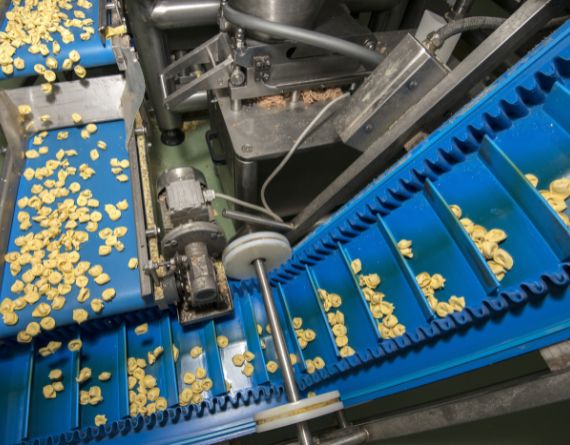
How Do Inclined Belt Conveyor Work?
An incline conveyor belt comprises a continuous belt loop wrapped around drive and tail pulleys, all mounted in a rigid stainless-steel frame. A motor powers the drive pulley, pulling the belt up or down the angled structure. Your inclined conveyor design—length, angle, and height—is folded and customized to fit your plant’s layout. The conveyor’s slide or roller bed, often made from folded steel with trundle wheels or removable bed panels, supports smooth belt movement under load.
When selecting an incline conveyor belt for sale, you’ll choose from various incline conveyor belt types—flat-top, friction-top, or inclined cleated conveyors—based on product size, weight, and flow characteristics. This tailored approach ensures reliable, slip-free transport on slopes ranging from gentle rises to steep 35° inclines.
Why Our Inclined Belt Conveyor ?
Gravity-Resistant Transport: Cleats and friction top surfaces prevent rollback.
Space Optimization: Elevate products where floor space is limited.
Gentle Handling: Smooth transitions safeguard delicate items.
Customizable Angles & Speeds: Tailored to throughput and product characteristics.
Easy Integration: Interfaces seamlessly with flat, decline, and curved conveyors.
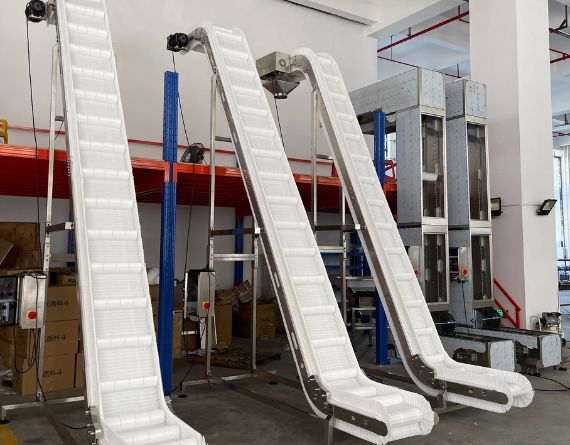

Types of Incline Conveyor Belts
Flat-Top Incline Belt
Uses frictional belt surface for slight angles (up to 10°).
Inclined Cleated Conveyor
Equipped with molded cleats (20–100 mm high) for steep angles (15°–35°).
Sidewall & Cleat Hybrid
Combines vertical walls and cleats for maximum containment at very steep angles.
Modular Plastic Incline Belt
Interlocking modules with cleats for wash-down and food-grade applications.
Maintenance & Care Tips for Incline Conveyor Belts
To keep your Incline Conveyor Belts running reliably and efficiently over the long term, regular maintenance is essential. Following these simple steps will help you extend the lifespan of your system, minimize downtime, and maintain production flow.
Daily Cleaning:
Clean the belt surface, rollers, frame, and other parts to remove dust, debris, and material residues.
After handling sticky or wet products, clean promptly to prevent buildup that can affect friction and smooth operation.
Tension Adjustment:
Check the belt tension regularly.
Too loose? The belt may slip.
Too tight? It increases motor load and belt wear. Adjust tension following the user manual to keep it optimal.
Lubrication:
Regularly lubricate bearings, gearboxes, and other moving parts with manufacturer-recommended lubricants to ensure smooth operation.
Wear Inspection:
Inspect belts, rollers, bearings, cleats, and side skirts for wear or damage. Replace worn parts promptly to avoid costly breakdowns.
Electrical System Check:
Ensure cables and terminals are secure. Check motors and control boxes for cleanliness and unusual heat or smells to prevent short circuits or faults.
Safety Devices:
Test emergency stops, guards, and limit switches regularly to ensure they work properly and keep your team safe.
Avoid Overloading:
Operate within the designed capacity to prevent strain on the belt and drivetrain. Overloading accelerates wear and may damage the system.
Environment Considerations:
Adapt maintenance routines based on temperature, humidity, or corrosive conditions. Ensure belts and components are rated for the environment.
By performing routine cleaning and inspections, your incline conveyor system will remain in peak condition, keeping your production line running smoothly and efficiently.
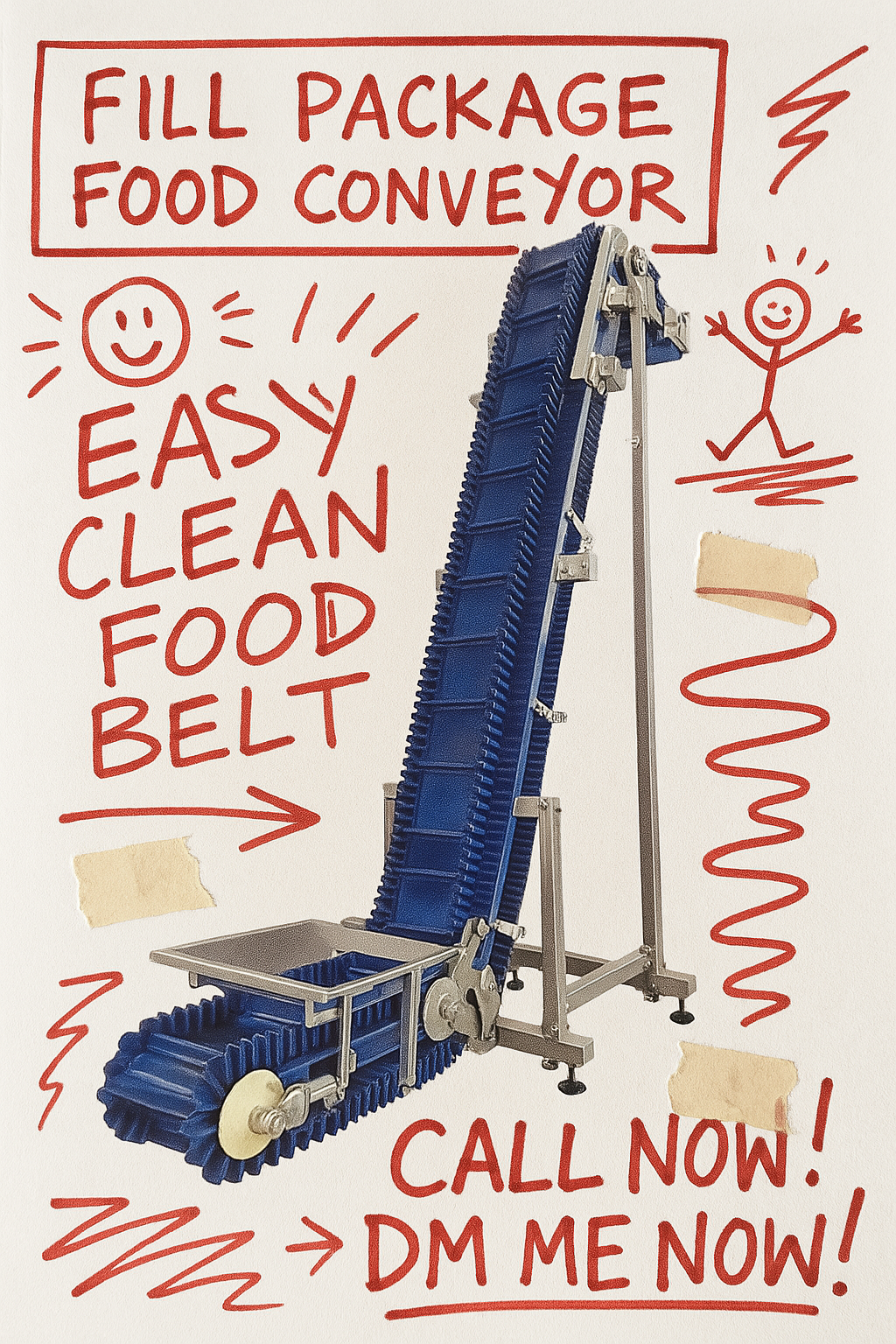
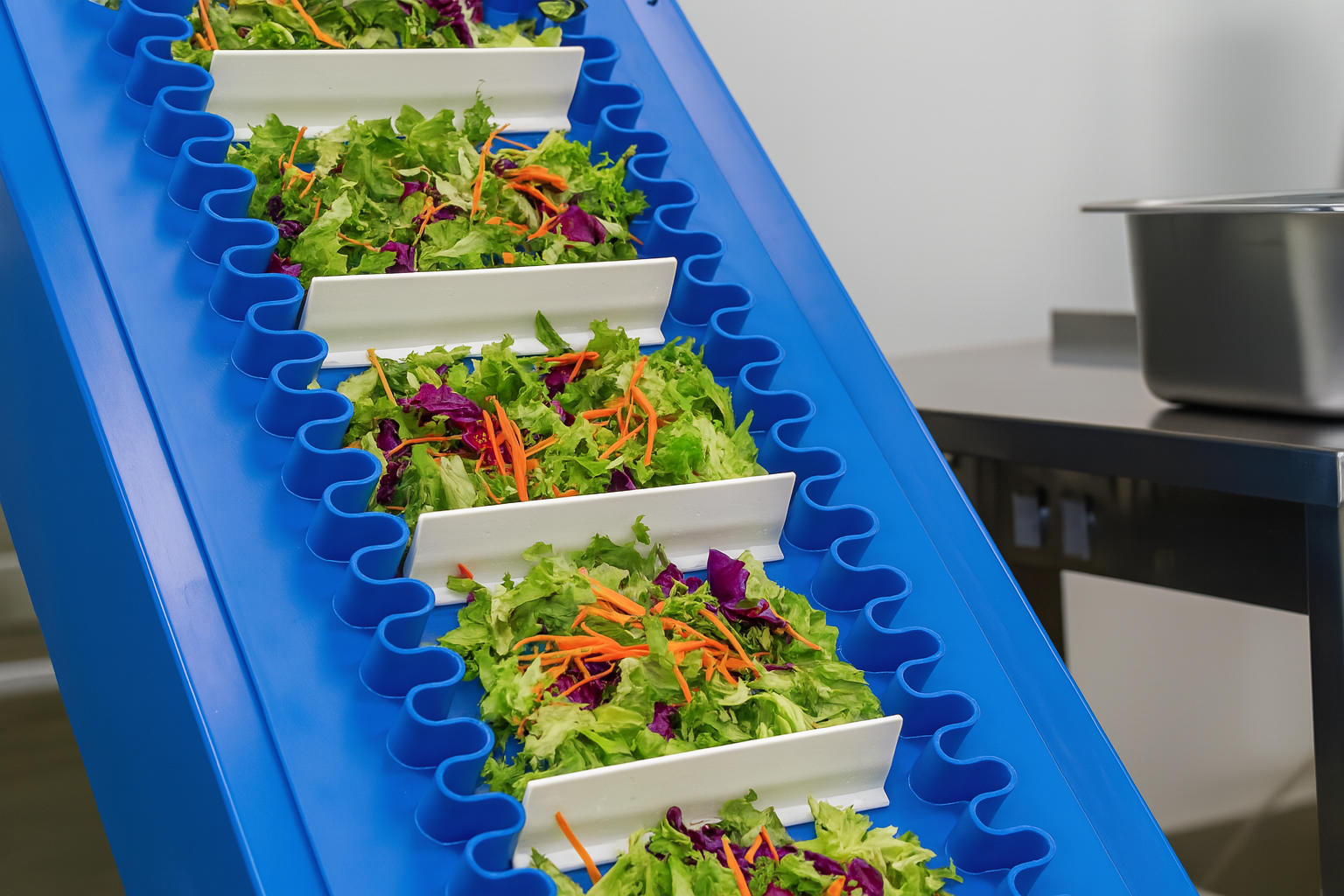
What We Can Customize:
Our expert team works closely with you at every stage—from initial consultation, design, and manufacturing to installation and commissioning—to deliver a turnkey solution tailored to your needs.
Size Customization:
We design conveyor length, width, and height based on your space and material handling needs.
Material Options:
Choose from a wide range of belt and frame materials to match your product characteristics and working environment. Options include wear-resistant, oil-resistant, corrosion-resistant, high-temperature, and food-grade conveyor belts.
Functional Modules:
Add-ons like cleats, side skirts, adjustable-height frames, mobile bases, emergency stop systems, or variable speed drives (VFD) for precise control.
System Integration:
Seamlessly integrate with existing food conveyor systems, packaging machines, and sorting lines for full automation.
Special Environments:
We provide designs for cleanrooms, humid areas, dusty or corrosive environments with enhanced protection and custom-built conveyor systems.
By choosing our customized incline conveyor solutions, you’re not just buying a conveyor—you’re getting a productivity booster tailored to your business, helping you save time, reduce costs, and stay competitive
Our standard incline conveyor belt types cover angles from 5° to 35°. For steeper needs, hybrid sidewall-cleat solutions are available.
We offer incline conveyor belt for sale in standard widths and lengths, as well as fully custom designs to fit your layout and product requirements.
- For gentle slopes (<10°) with solid products, flat-top belts with high-friction covers suffice.
For steeper inclines or small/granular items, select an inclined cleated conveyor with appropriate cleat height.
Yes. We provide food-grade incline conveyors using PU/PVC belts or modular plastic belts, with wash-down frames and FDA-compliant materials.



